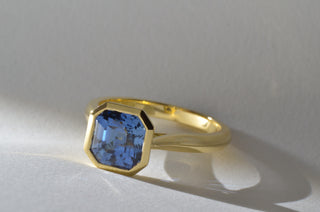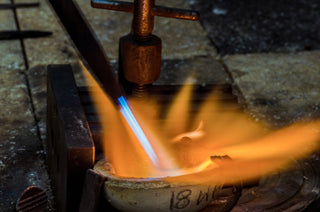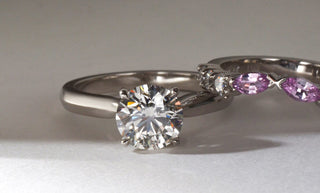Why Choose a Sapphire?
Sapphires are prized for their beauty, durability, and individuality. They belong to the corundum family, which also includes rubies, meaning that rubies are essentially red sapphires. Beyond their famed deep blue hue, sapphires are available in a kaleidoscope of colours, making them ideal for those seeking a unique piece of jewellery that expresses their personality.
The '4 Cs' of Sapphires
While sapphires are evaluated based on carat, clarity, colour, and cut, these factors differ from what we look for in diamonds. Here’s what to consider:
1. Carat
When it comes to carat (the weight of a stone), it's important to keep in mind that sapphires and diamonds can’t be directly compared. Firstly, sapphires are denser than diamonds, so a sapphire will appear smaller than a diamond of the same carat weight. Additionally, well-cut sapphires tend to be deeper than diamonds to retain their rich colour and sparkle. That's why instead of focusing on the carat weight, it’s better to look at the sapphire’s face-up size, proportions, and measurements to get a clearer idea of how big it will look in your jewellery design.
2. Clarity
Natural sapphires nearly always feature inclusions—tiny imperfections that form during their creation. Unlike diamonds, sapphires are not graded on detailed scales like FL (flawless) or SI (slightly included). Instead, they are generally categorised as eye clean (inclusions not visible to the naked eye) or not eye clean (inclusions visible without magnification).
Small inclusions are usually not seen as a drawback, and can add to the character of the stone as long as they’re not obvious. However, heavily included sapphires may appear dull or cloudy, so it’s something to keep an eye out for. On the other hand, a sapphire that is completely free of inclusions could be a sign that it’s synthetic.
3. Colour
Colour is the most significant factor in a sapphire’s value, with more vivid and uniform hues typically commanding higher prices. However, colour choice can also be deeply personal and subjective.
Blue sapphires have long been the most prized, especially those in rich, velvety blue tones with mid to semi-dark depths. That said, alternative shades like cornflower blue, pale blue, and teal have grown increasingly popular in recent years.
Sapphires also come in a wide range of "fancy colours," including pink, yellow, green, purple, and orange, with each hue offering its own unique appeal. Moody shades like grey and bronze add an air of intrigue, while black and white sapphires provide minimalist elegance. Among fancy sapphires, padparadscha sapphires—coveted for their rare pinkish-orange colour—are considered the most valuable.
While jewellers assess sapphires for the uniformity and intensity of their colour, the most important factor is finding a shade that resonates with you. Less traditional colours or lighter hues with a diamond-like sparkle can be just as captivating and meaningful as the classic blues.
4. Cut
Sapphires are cut to enhance their colour and brilliance rather than to conform to standardised shapes like diamonds.
Deeper cuts are often used to amplify colour intensity and to avoid the “window” effect, where the centre of the stone appears washed out. In contrast, shallower cuts may result in less vivid colours but are sometimes chosen for specific designs or to maximise the visible size of the stone.
Treated vs. Untreated Sapphires
Most sapphires undergo treatment to improve their colour and clarity, with heat treatment being the most common. This process is widely accepted in the jewellery industry as it that enhances colour and eliminates unstable inclusions. However, untreated sapphires with intense colour are highly prized and command a higher price due to their rarity.
Other treatments include Beryllium-treated sapphires, known for their bright colours, offer an affordable option. However, fracture-filled sapphires should be avoided due to their instability.
Natural vs. Lab-Grown Sapphires
Lab-grown sapphires offer an affordable and durable alternative to natural stones. They share the same chemical and physical properties as natural sapphires, making them a suitable choice for bespoke jewellery.
Caring for Your Sapphire
Sapphires are robust and perfect for daily wear, but a little care goes a long way in preserving their brilliance. To keep your sapphire looking its best, clean it regularly with warm water and mild detergent. You can also bring it to us for complimentary professional cleaning and polishing, which can restore its sparkle.
To protect your sapphire, avoid wearing it while gardening, playing sports, or doing any activity where it might be hit or scratched. A good rule of thumb is that if you wouldn’t do the activity in a silk dress, you shouldn’t wear your jewellery!
Value and Individuality
Sapphires often offer better value than diamonds, allowing you to choose a larger or more vibrant stone within your budget. They’re also perfect for expressing individuality, with countless colours and combinations to suit any taste.
Our Process
If you’re considering a custom sapphire piece, we make the process seamless:
- Initial Consultation: We’ll discuss your design ideas and preferences.
- Sourcing: We’ll present a curated selection of sapphires for you to choose from. Our stock includes loose stones in various sizes and colours, and we work with trusted gem merchants in New Zealand and Australia to source additional options.
- Design: Once the perfect stone is selected, we’ll create a bespoke piece just for you.
If you’re considering a sapphire for your next piece of jewellery, we’d be delighted to help you explore the possibilities. Whether you’re drawn to classic blue tones or intrigued by the rainbow of fancy colours, we can guide you through the options and help you find a stone that perfectly reflects your style. Visit us in-store or get in touch to learn more about our collection and bespoke design services.







